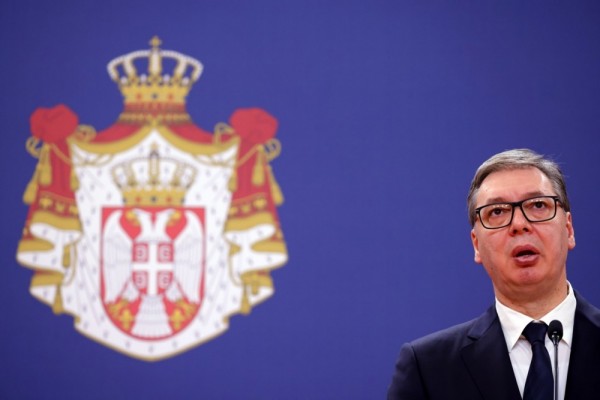As final negotiations draw to a close this week in New York, the IPI global network urgently calls on the United States and the European Union to stand firm and reject a global treaty that will give authorities sweeping surveillance powers and hand authoritarians even more tools to target and punish journalists and other public watchdogs.
For more than three years, states have been negotiating a new global convention backed by Russia, China, Iran, Venezuela and other authoritarian states that could usher in a new era of transnational surveillance and repression, putting journalists and civil society at even greater risk around the world. While purportedly aimed at combating cybercrime, the treaty instead vastly expands states’ spying and investigatory powers, including across borders, while hollowing out existing international human rights treaties and obligations that provide essential protections for journalists to do their jobs freely and safely.
Across seven previous rounds of negotiations, a group of states that includes the U.S. and the EU – which represents all 27 EU-member states in these deliberations – have sought to narrow the treaty’s scope and insert human rights safeguards to prevent overreach and abuse. But these efforts have yielded only minimal results. As negotiations conclude this week, the final draft text remains deeply flawed, as key points of contention over the treaty’s wide scope and lack of human rights safeguards have yet to be resolved, and key input from civil society and industry remains unaddressed.
To our dismay, the U.S. and the EU appear poised to sign on to the treaty despite these critical flaws. We therefore urge U.S. and EU negotiators to stand strong and avoid compromising on press freedom and human rights for the sake of reaching consensus. These delegates must not compromise on any aspect of this treaty that threatens the full exercise of online rights and freedoms and that could put journalists’ privacy, safety, and security – and their ability to report safely and independently – at risk anywhere in the world.
At this late stage in these negotiations – and given how much work would still need to be done to shore up critical gaps in order to ensure the protection, safety, and security of journalists and civil society across the globe – we strongly urge U.S. and EU to reject this treaty, which is on track to becoming a dangerous new weapon for silencing and punishing journalists and critical voices at a time when democracy is under great strain as authoritarianism gains strength around the world.
How governments are abusing cybercrime laws to punish journalists and critics
This treaty reflects a global trend of governments using laws and regulations billed as combating “cybercrime” to censor online expression and expand state surveillance. Under the guise of tackling the legitimate and growing problem of cybercrime – such as malicious hacking and ransomware attacks – governments are developing overly broad and vague cybercrime laws that reach far beyond tackling core cyber dependent crimes. Instead, these laws have become powerful tools for online censorship and surveillance, used to silence and punish journalists, activists, researchers and other public watchdogs.
Often these laws include vague content-based offenses aimed at combating terrorism, disinformation, and the spread of hate speech online – and hand authorities sweeping surveillance powers to police and punish a range of online expression that is protected under international law, including with offenses such as “cyber libel,” “cyberterrorism,” “cyber bullying”, “online blasphemy,”” and bans on the publication of “false news”, “content undermining the state or the constitution,” “incitement of public disorder,” or content that offends “public morals.”
For instance, numerous journalists in the Philippines have been targeted and charged with “cyberlibel” under the country’s vague and overbroad cybercrimes law – including Nobel laureate and IPI Executive Board member Maria Ressa, whose outlet Rappler often investigates government corruption and crime.
In Bangladesh, the hundreds of journalists have been ensnared by the 2018 Digital Security Act, which has since been replaced by an equally problematic cybersecurity law. In Pakistan, scores of journalists have been arrested on charges of violating the 2016 Prevention of Electronic Crimes Act (PECA), which criminalizes online speech that brings the armed forces, judiciary, or intelligence agencies into “disrepute”. Recent amendments to this law extended its provisions beyond the online sphere, criminalizing any “fake news” or the “ridiculing of a person” on television.
The abuse of overly broad cybercrime laws is rampant across Africa – including in Mali, Niger, Nigeria, Kenya, Tanzania, Rwanda, Uganda, Zambia, and Zimbabwe – where governments frequently use such laws to target and jail journalists, stifle criticism of public officials, and to justify the expansion of state surveillance. Lawmakers in The Gambia – often regarded as a beacon of press freedom across the continent – are now considering a draft cybercrime law with vague content restrictions that would criminalize the “spread false news” online, mirroring similar provisions found in other repressive cybercrime laws across Africa.
In Jordan, thousands of journalists, writers, and activists had been arrested under the country’s former cybercrime law, which gave authorities sweeping powers to censor online speech. The country’s new 2023 cybercrime law has been used repeatedly to arrest journalists who are covering Jordan’s role in the Israel-Gaza war. In Tunisia, six journalists were recently arrested under the country’s draconian cybercrime law, which grants authorities extensive surveillance powers and carries prison sentences for the publication of “rumors” and “false news”, among other vague and overbroad categories.
Examples of governments using cybercrime laws to target, surveil, arrest, and jail journalists continue to proliferate across the globe. The draft UN treaty being negotiated embodies in spirit and in substance the same type of overly broad, vague cybercrime laws already being abused by authorities in many countries around the world. If adopted, it will be a highly dangerous UN instrument that gives legitimacy to states currently using repressive cybercrime laws to punish journalists and critics. And by hollowing out existing international human rights standards and obligations, this treaty could undercut ongoing and hard fought efforts by civil society in many countries around the world to reform abusive cybercrime laws by ensuring those laws align with international human rights standards and obligations.
In addition, in its current form the treaty could pave the way to increasing transnational repression of journalists by requiring other governments to become complicit in the persecution of journalists and dissidents by repressive regimes. This has alarming implications for the thousands of journalists in exile or seeking safe haven from government harassment or persecution.
In 2023 the U.S. and many EU states who are members of the Media Freedom Coalition issued a warning about the growing transnational repression of journalists globally, calling on governments to “meet their obligations under international human rights law, to cease and counter transnational repression, and protect journalists and media workers against human rights violations and abuses.”
We now call on the U.S. and the EU to do the same.
As negotiations conclude this week in New York, we strongly urge the U.S. and the EU not to compromise the fundamental human rights on which journalists around the world rely order to do their jobs freely and safely, for the sake of reaching consensus.



